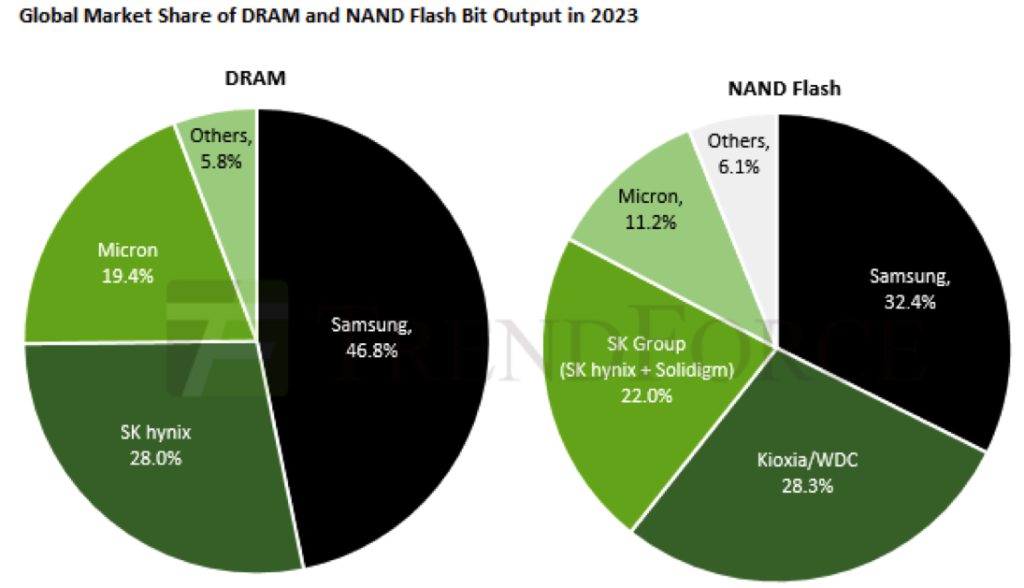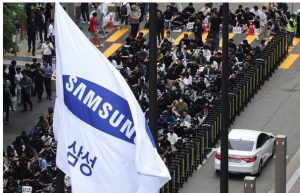Strike at Samsung in South Korean DRAM/SSD Plants
No immediate impact on production
This is a Press Release edited by StorageNewsletter.com on June 5, 2024 at 2:02 pmThis report was written by TrendForce Corp. on May 31, 2024.
Samsung Strike Has No Immediate Impact on Memory Production,
with No Shipment Shortages
The Samsung Electronics Union is reportedly planning to strike on June 7, TrendForce reports that this strike will not impact DRAM and NAND Flash production, nor will it cause any shipment shortages. Additionally, the spot prices for DRAM and NAND Flash had been declining prior to the strike announcement, and there has been no change in this downtrend since the announcement.

Samsung’s global share of DRAM and NAND flash output in 2023 was 46.8% and 32.4%, respectively. Even though the South Korean plants account for all 46.8% of global DRAM production and about 17.8% of global NAND flash production, TrendForce identifies 4 reasons why this strike will not impact production.
Firstly, the strike involves employees at Samsung’s headquarters in Seocho, Seoul, where union participation in higher, but these employees do not directly engage in production.
Secondly, this strike is planned for only one day, which falls within the flexible scheduling range for production.
Thirdly, June 6 is a public holiday in South Korea, and some employees had already applied for leave on June 7, allowing for preemptive adjustments in production scheduling and manpower allocation.
Finally, fabs rely heavily on automated production and require minimal human labor. Therefore, the strike will not have any substantial impact on the future memory supply.

Comments
According to CNN, a labor union representing tens of thousands of workers at Samsung Electronics in South Korea has called a one-day strike next week, in what would be the first such walkout at the smartphone and chipmaking giant.

The Nationwide Samsung Electronics Union (NSEU) said last week during a press conference streamed on its official Youtube channel that its 28,000 members - just under a quarter of the company’s total workforce in the country - would strike on June 7, following failed negotiations over pay and bonus arrangements.
"We can no longer afford to see a company that has no will to negotiate," union representatives said. “We will fight for workers’ rights and interests."
Son Woomok, a union leader, told CNN that many NSEU members worked for Samsung’s flagship semiconductor unit.
"We are demanding transparent and fair performance bonuses and wage increases," he said in an interview.
"There has never been a proper wage negotiation. It has always been carried out by announcing the (outcome) at the labor-management council, which does not include our union, and the company telling us to accept it," he added.
In a statement to CNN, a Samsung spokesperson said: "The company remains committed to engaging in good faith negotiations with the union, and is making every sincere effort to come to an agreement."
The world’s biggest memory chipmaker has had a rough few years. A historic shortage of computer chips during the Covid pandemic was followed by falling demand last year as consumer appetite for electronics remained weak because of global economic uncertainty.
In January, Samsung reported an operating profit of just 6.567 trillion won ($4.8 billion) for 2023, its weakest annual performance since 2009, according to the Wall Street Journal. Samsung also lost its crown as the top smartphone maker globally.
But things are looking up for the company because of the AI boom.
It is optimistic about a resurgence in demand for mobile devices this year, particularly with the rollout of new products, such as AI-powered smartphones.
Last month, Samsung reported a more than 10-fold rise in first-quarter operating profit amid forecasts of high demand for AI and high-end chips, an area in which it competes with Intel (INTC) and Taiwan’s TSMC.
The vast majority of the world’s advanced microchips are made in just 2 places: Taiwan and South Korea. Taiwan’s industry is larger and more dominant, something South Korea is keen to challenge.













 Subscribe to our free daily newsletter
Subscribe to our free daily newsletter

